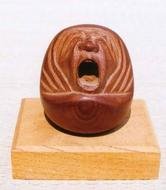:::::::::::::::::::::::::::::::::::::::::::::::::::::::::::::::::::::::::::::::::::::::::::::::::::::
Fudo Myo-O Gallery
:::::::::::::::::::::::::::::::::::::::::::::::::::::::::::::::::::::::::::::::::::::::::::::::::::::
If you meet the Buddha on the road, kill him!
When I once (more than 30 years ago) tried to outsmart my Japanese Archery (Kyudo) teacher with Western Wit and this saying, he gave me the "Asiatic smile" and replied:
Be careful with Asian wisdom.
The first Buddha you are going to meet on the WAY
is yourself.
Are you ready to kill ?
:::::::::::::::::::::::::::::::::::::::::::::::::::::::::::::::::::::::::::::::::::::::::::::::::::::

The text on the painting reads: Hui-K’o, the great general, (retired), was troubled in his search for the way. Many times he beseeched the Daruma to teach him and to pacify his mind.
Always, The Daruma refused.
To show his utter sincerity, Hui-K’o cut off his own left hand.
“What do you seek?”, asked The Daruma.
“Peace of mind”, replied Hui-K’o.
“Show me this mind of yours”, said The Daruma, “and I will pacify it”.
“But when I seek my mind, I cannot find it”, was the reply.
“THERE!” , said The Daruma, “I have pacified your mind!”
----- “YES!”, said Hui-K’o, and laughed.
Hui-K’o retired about 525 C.E., I think, and after the very first “satori” or “sudden and complete awakening”, became the second Patriarch of Chan, or Zen, Buddhism. Satori is sort of the central and defining characteristic of the Chan or Zen variety of Buddhism.
In the painting, The moon-filling tile patch, (where an agonized Hui-K’o holds his severed hand and the Daruma’s back is turned to him),is a Penrose P-3 tiling. That is to say, it is based not on the darts and kites ,(p-2), but on the fat-and-skinny rhombs,(P-3).
A plot for the moon-covering patch is shown on a scrap of paper on the ground in front of the Daruma. I think Prof. Paul Steinhardt called this patch a “seed” in his Physics Review Letters piece de-mystifying how quasicrystals might form without somehow reading the future.
Mystical, and replete with B.S. though it is like any religion, I have much more respect for Zen Buddhism than for any other religion. And not merely for its aesthetics. Zen is the only religion I know of that provides for its own transcendence.
Thus: Zen says,
If you meet the Buddha
on the path to enlightenment,
kill him.
Here one finds no equivocation or uncertainty about what to do if doctrine or dogma or specifically religious values of any sort or sanctity should interfere with your progress toward wisdom and enlightenment. I
In short: Dispense with the B.S. and get on with the enlightenment!
source : 2000 John A.L. Osborn
Thank you, John !
:::::::::::::::::::::::::::::::::::::::::::::::::::::::::::::::::::::::::::::::::::::::::::::::::::::
Embrace nothing:
If you meet the Buddha, kill the Buddha.
If you meet your father, kill your father.
Only live your life as it is,
Not bound to anything.
Gautama Buddha
:::::::::::::::::::::::::::::::::::::::::::::::::::::::::::::::::::::::::::::::::::::::::::::::::::::
Zen Master Lin Chi spoke thus:
If you meet the Buddha, kill the Buddha.
If you meet a Patriarch, kill the Patriarch.
Lin Chi isn't condoning murder, he is using a metaphor to explain the nature of Buddhism.
Don't believe what some one says, no matter how holy they are, just because they say it.
:::::::::::::::::::::::::::::::::::::::::::::::::::::::::::::::::::::::::::::::::::::::::::::::::::::

The Pilgrimage of Psychotherapy Patients
Sheldon B. Kopp
:::::::::::::::::::::::::::::::::::::::::::::::::::::::::::::::::::::::::::::::::::::::::::::::::::::
If you meet the Buddha on the road . . . buy him!

:::::::::::::::::::::::::::::::::::::::::::::::::::::::::::::::::::::::::::::::::::::::::::::::::::::
They ask me why I live in the green mountains.
I smile and don't reply; my heart's at ease.
Peach blossoms flow downstream, leaving no trace
- And there are other earths and skies than these.
. Li Po 李白 (701-762)
:::::::::::::::::::::::::::::::::::::::::::::::::::::::::::::::::::::::::::::::::::::::::::::::::::::
Daruma Pilgrims in Japan
O-Fudo Sama Gallery
:::::::::::::::::::::::::::::::::::::::::::::::::::::::::::::::::::::::::::::::::::::::::::::::::::::






No comments:
Post a Comment